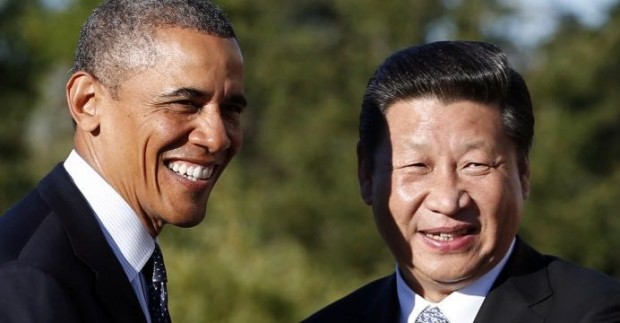Summits Over Substance: Obama Yields To Chinese President Xi
Posted on
As Washington gears up for the visit of Chinese leader Xi Jinping, right on the heels of the Pontiff, there is a growing urgency for the United States to make clear to Beijing that its behavior is leading to increased tension at both the bilateral and regional level. But, there appears little appetite for such plain speaking; instead, the Obama Administration is projecting an aura of weakness, not resolve. Indeed, it is sobering to consider several incidents that have been revealed in just the past few weeks.
Item: The Chinese arrested an American businesswoman on charges of spying, and have held her for as long as six months before making her arrest public. Compare this with the stream of leaks from “senior US Government officials” that the United States was contemplating the imposition of sanctions for Chinese cyber-espionage, only to ultimately decide to impose none.
Item: The Chinese dispatched two fighter planes to intercept a US reconnaissance aircraft flying over international waters, which then proceeded to act in an “unsafe” manner against the American aircraft. This is only the latest such incident; previously, Chinese fighters have conducted a barrel roll over a US anti-submarine aircraft and nearly caused a collision by stopping right in front of a US warship. Compare this with the reluctant admission by administration officials that the United States has not entered within 12 nautical miles of Chinese artificial islands (which exert no claims) since 2012, even before Xi Jinping became president.
Item: The Chinese have significantly expanded the scope of their military operations, including the first bilateral naval exercises (with the Russians) in the Mediterranean, and a Chinese naval task force transit of waters off the Aleutians. Despite an invitation to the next RIMPAC and participating in the 2014 RIMPAC exercises (which saw a Chinese spy ship monitoring the activities, even as the Chinese navy also participated), there is no sign of any Chinese intention to reciprocate American access to Chinese exercises.
Item: The Chinese hiked defense spending another 10 percent for 2015. The 300,000 man cuts announced at the recent Chinese military parade three weeks ago do not reflect a cut in overall defense resources, but a reallocation, as the billets and budgets are likely to be shifted to the Chinese navy, air force, Second Artillery, and space forces. The United States, meanwhile, continues to operate under sequestration that requires half of all spending cuts come from the defense realm. While Chinese military exercises expand, American ships are often tied up in port, and pilots see their flying hours cut.
Whether Beijing is testing Washington’s resolve, or they are indicating a lack of respect for the American leadership, the end result is the same—the message is that China can treat the United States as it will, and the Americans will not respond. Given that the audience for Chinese action and American fecklessness includes America’s allies in the western Pacific, such an approach potentially undermines American credibility. If the United States will claim to be upholding Freedom of Navigation and the unacceptability of Chinese claims, but then deliberately avoids antagonizing China, how credible are other American commitments? If the United States is so concerned about ensuring a smooth summit that it will allow its own citizens to be arrested and harassed without protest and for Chinese cyber activities against American targets to go unanswered, how likely is it to be willing to challenge Chinese actions over uninhabited islands or waters where there is no direct US claim?
Even more dangerous is how the Obama Administration is essentially misleading President Xi into thinking that he can act with impunity. This may be true for the remaining 16 months of the Obama presidency, it is not likely to be the case with his successor. Whether Democrat or Republican, the next occupant of 1600 Pennsylvania Avenue is unlikely to be as obliging of Chinese assertiveness as President Obama has been.
Also, while President Obama will soon disappear from the scene, President Xi will not. Short of a tectonic shift in Chinese politics, Xi will return after the 2017 Party Congress. He will face a new cohort of senior leaders as almost all of the rest of the Chinese Communist Party Politburo Standing Committee will have to retire. Xi Jinping will therefore have enormous influence over the perceptions of the newly minted Politburo Standing Committee members, and the lessons he has derived in these first five years will undoubtedly affect his policy decisions.
By valuing summitry over substance, President Obama is misleading the Chinese leadership about American will and creating the conditions for further miscommunications and misunderstanding between Beijing and Washington for years to come.
Dean Cheng, one of the top US experts on the Chinese military and the PRC’s space program, is an analyst at the conservative Heritage Foundation.
Subscribe to our newsletter
Promotions, new products and sales. Directly to your inbox.

